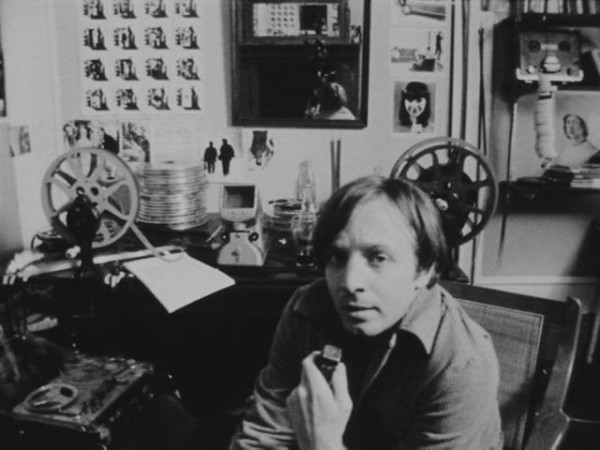David Holzman's Diary
I
can't imagine how progressive 1968's DAVID HOLZMAN'S DIARY must've
seemed to its original audiences. Mind blowing, I would think. Viewed
in 2016 it seemed quite ahead of its time, a precursor to YouTube and
reality T.V. That is, once you get past the dated element of having its
subject - a young New Yorker who decides to put his life on film - lug
around heavy equipment like a shoulder mounted camera and reel to reel
tape recorder. But everything else is as true in the twenty-first
century as it was in the summer of 1967 and likely well before.
David
(L.M. Kit Carson) is a newly unemployed twenty-something who decides to
put Jean-Luc Godard's statement "The cinema is truth at twenty-four
frames per second" to a test. As Holzman's life seems to be
scattershot, frustrating, and without purpose, he wonders if filming
himself and his surroundings, then "playing the film back and forth"
will offer some enlightenment. Is this because he feels that the camera
will objectively document a landscape that is often confusing to
process? Or is it that the movies have provided David will some level of
comfort in the past? He's very learned of the cinema, discussing the
likes of Truffaut and Vincente Minnelli.
The young
man's friend, a verbose artist named Pepe, explains why he thinks the
whole project is a bad idea. Pepe explains that subjects who know they
are being filmed can't act naturally, and will inevitably become
concerned about how to pose, what side of the frame to sit in, etc. Real
life is no longer real life when it is captured on celluloid; it
"becomes part of something else." Most people do not feel comfortable
with an electronic voyeur, perhaps even those who sign up for current
shows like Big Brother. On a side note, I had a patient who once
starred on that show and explained, quite conversely, that he didn't
mind having dozens of cameras document his teeth brushing and combat
with roommates. He found it quite boring, in fact. One idea that this
movie does not consider is how incentivization affects the process.
David
Holzman sometimes sits in front of the camera and discusses his life,
other times narrating while shooting street life and the window of the
woman who lives across from him. In an early sequence, David pans down
the streets of his Upper West Side neighborhood and describes the
significance of certain buildings like The Dakota. I had an odd moment
of recognizance just then, recalling how I did much the same on an early
'90s trip to NYC. I had a bulky camera rented from Blockbuster Video
and I pointed it at everything. There was a moment when I left it
running on a brick wall as I walked away. A passerby politely stated
how ill advised that was - "This is New York."
I'm
sure I irritated some people. One early morning on a subway platform I
irritated the friend with whom I was traveling, his head shaking as I
slowly framed the area. David irritates his girlfriend, Penny (Eileen
Dietz) with his insistence on filming her cooking, sitting, even
sleeping. In the nude. The latter is the final straw; she angrily bolts
from his apartment in the wee hours when she discovers his hovering.
David can't really understand why this woman, a model who is no stranger
to the camera, is so reluctant. He explains that she is part of life,
so he needs to film her. Perhaps she did not need to figure out her own
purpose. Perhaps she was content.
DAVID HOLZMAN'S
DIARY, directed by young talent Jim McBride, who would go on to helm THE
BIG EASY and a remake of Godard's BREATHLESS in the '80s, really is a
stunningly fascinating experiment. I was expecting another pretentious
ego trip; there were many of this type in the late '60s and beyond. But
even though David is a bit of a prig and a cipher (not to mention stalker),
we can understand and maybe sympathize with him a little. Plus there
are some really mesmerizing sequences, like the circling of the elderly
on park benches while we hear a recording of a voting session at the
United Nations. Also, the excitement of the use of a fish eye lens for
the first time. Or hearing radio broadcasts of the news while the
camera roams the streets, most tellingly by people of color as we hear
news of riots in Newark.
I also found the scene where
David unspools a film of his night of watching prime time T.V. - shown
like someone is fast forwarding a tape - a parade of images showcasing
hours of programs like Batman and Star Trek and the
evening news, along with all the commercials in between - quite
engrossing and disturbing. It plays in a way that perhaps mirrors the
way we remember all the television and movies we've seen. Random
snippets flying by, perhaps some laden with subliminal messages. Like
one's own life passing by.
Does David find purpose at the end? He finds reality. Perhaps like his many progenitors of decades later would.



Comments